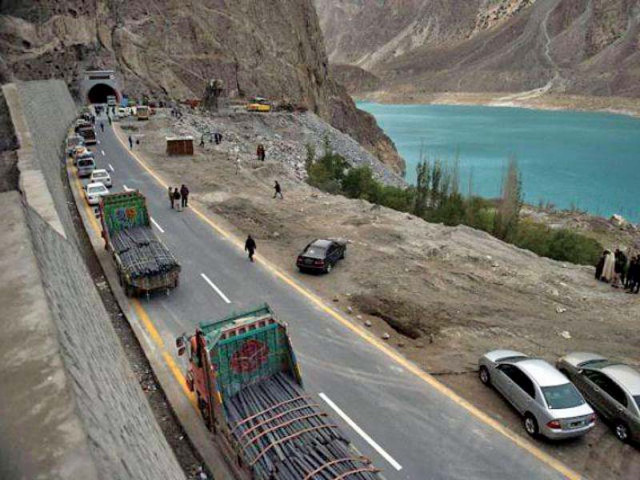CPEC: the goose with the golden eggs
So far, Islamabad has not passed on any tasks beyond the security assignment

PHOTO: AFP
CPEC and CPAC
Considering its high stakes, Beijing decided to iron out the issues with the stakeholders in the southwest. On October 18, the Chinese ambassador had a detailed meeting with PTI Chairman Imran Khan at Bani Gala. The frank discussion resulted in Imran almost giving an undertaking of not attacking CPEC. Within days, he spelled it out in a public rally too. “Our differences on CPEC are not with China but the federation.” There has been no volte-face on this one, at least.
On December 29, the federal minister and Pakistan’s point-man on CPEC affairs, Ahsan Iqbal, led the chief ministers of all the four provinces and the premier’s special assistant on foreign relations at the sixth meeting of the Joint Cooperation Committee (JCC). The two sides reviewed progress and irritants on the ongoing projects. The highlight of the agenda was investment in the industrial sector, fine-tuning new transportation projects and upgrading and expanding the Karakoram Highway. Convening of such a forum in China points to the seriousness with which it is taking all stakeholders along with transparency and confidence and Beijing’s own capacity of dealing with the intricacies in Pakistan.

On the contrary, Modi’s India has been desperately playing all its cards, from fuelling insurgency in Balochistan to sabre-rattling on Kashmir and threatening to divert rivers in contravention of the Indus Waters Treaty. Delhi’s frustration at CPEC reassures Pakistan and China of the promise that the logistical economic corridor and strategic partnership hold.
Local Industry and the CPEC Promise
Given the chequered history of civil-military relations, the decision-making concerning CPEC-related affairs and the execution of projects can have multifaceted implications for the country. Now that the premier has appointed the second set of four-star generals, the comfort level and self-confidence might have been boosted. On the flip side, what about the temptation of hiring favourites for coveted jobs instead of merit? There are also questions about the route of motorways. How far political or institutional influence worked in determining which cities, towns and villages will the road pass through or simply bypass? It does not take a genius to figure out as to why the Lahore-Islamabad Motorway is 100 kilometres longer than centuries-old Grand Trunk Road. Is it not true that certain individuals bought vast swathes of land exactly where the motorway interchanges are to be built or the industrial estates will be set up? The spin-off benefits of CPEC are being sucked away by the powerful with little regard for principle of conflict of interest or rights of the locals. The culture of investing in land and gold has hindered the nation’s imagination and creativity. The bonanza of CPEC carries is blinding the state functionaries to their responsibilities of safeguarding the state interest.
Let’s hope that the suspicion of its ‘mismanagement’ becoming another pretext for the military to dominate Pakistan’s civilian administration proves to be a figment of the imagination. Optimism, however, wanes when looking at corruption-tainted politicians and bureaucrats working in the power circles.
Gwadar: at the centre of success?
How far can CPEC tip the balance in favour of Pakistan’s armed forces? Will authoritarian China endorse such a gradual shift in the power equilibrum. There can’t be a straight answer to such complex problems.
While China has repeatedly emphasised that CPEC will be a win-win for both the countries as well as the region, it has never shied away highlighting the significance of security. That’s where the role of military comes in.
To ensure four-layered security to the corridor and its related projects, Pakistan has already raised a Special Security Division (SSD) at a cost of Rs23 billion. The force, comprising some 14,000 security personnel, will not only safeguard around 10,000 Chinese workers in over 330 small and mega projects but also ensure safety from Gilgit to Gwadar besides dealing with emergencies. In the long run, the task is supposed to be transferred to the civilian security institutions after requisite capacity-building.
Will the government relinquish the management of CPEC to the military in some form beyond security? So far, Islamabad has not passed on any tasks beyond the security assignment. Given increasing tension along the eastern and western borders, the military is less likely to be engaged in apex committees taking vital decisions regarding the corridor. While China won’t be comfortable without it, Beijing has shown the will to work with the democratic institutions while building their capacity and sustaining smooth coordination. Within some time, the country’s CPEC secretariat must evolve with specialised manpower chosen above and beyond political leanings and nepotism.
Published in The Express Tribune, March 26th, 2017.
Like Opinion & Editorial on Facebook, follow @ETOpEd on Twitter to receive all updates on all our daily pieces.















COMMENTS
Comments are moderated and generally will be posted if they are on-topic and not abusive.
For more information, please see our Comments FAQ